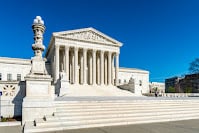Copywrite: Stocklite Lawyers representing doctors in Florida told a U.S. District Court judge this...
APA Speaks Out Against Supreme Court Ruling on Affirmative Action in Higher Education

In a statement today, APA said that the U.S. Supreme Court’s ruling in Students for Fair Admissions v. President and Fellows of Harvard College and Students for Fair Admissions v. University of North Carolina will “undermine the ability of colleges, universities, and medical schools to build a workforce of health care professionals that can effectively treat the increasingly diverse body of patients they serve.”
In the case, the Supreme Court ruled 6-3 that the admissions programs at Harvard and the University of North Carolina (UNC) that relied in part on racial considerations violate the Constitution’s guarantee of equal protection under the 14th Amendment.
APA argued, however, that the decision will impede progress to achieve health equity in this country. “A holistic race-conscious admissions process is an effective tool in assembling a diverse mental health workforce, which is critical to providing quality mental health care for all and addressing the mental health inequities that marginalized and minoritized individuals experience. Research supports that race concordance between physicians and patients and cultural sensitivity are associated with improved communication and better overall mental health outcomes.”
In July last year, APA Trustees voted to sign on to an amicus brief filed by the Association of American Medical Colleges in support of the UNC and Harvard admissions programs.
The brief stated, “[T]he legacy of American racial injustice has endured longer across the health care and medical-education systems than many might have predicted. As a result … if a program seeks a racially diverse student body with more than token representation, most schools will necessarily continue to rely on the consideration of an applicant’s racial or ethnic background in some cases. And any prohibition on the consideration of race in student admissions will therefore result in a student body with significantly fewer minority students.”
For related information, see the Psychiatric News article “Trustees Act on Amicus Brief in Harvard Case, Multiple Other Issues.”
(Image: iStock)





